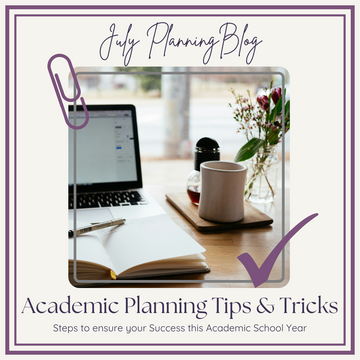Academic success often hinges on effective planning and organization. Whether you're a student balancing multiple courses or a professional pursuing further education, having a structured approach to your studies can make all the difference. Here are some tips and tricks to help you plan your academic journey successfully:
1. Set Clear Academic Goals
-
Define Your Objectives: Start by identifying what you want to achieve in your academic career, such as grades, skills, or degrees.
-
Make SMART Goals: Ensure your goals are Specific, Measurable, Achievable, Relevant, and Time-bound to provide a clear path forward.
2. Create a Study Schedule
-
Allocate Time Wisely: Dedicate specific time slots for each subject or course, ensuring a balanced approach to your studies.
-
Include Breaks: Schedule regular breaks to avoid burnout and maintain productivity.
3. Use a Planner or Digital Tools
-
Track Deadlines and Assignments: Use a planner or digital tools like apps to keep track of important dates and assignments.
-
Set Reminders: Utilize reminders for upcoming exams, project deadlines, and study sessions.
4. Prioritize Tasks
-
Identify Urgent and Important Tasks: Use a priority matrix to distinguish between urgent and important tasks, focusing on what needs immediate attention.
-
Break Down Large Projects: Divide large assignments into smaller, manageable parts to prevent feeling overwhelmed.
5. Develop Effective Study Habits
-
Active Learning Techniques: Engage with the material through techniques like summarizing, questioning, and teaching others.
-
Avoid Multitasking: Focus on one task at a time to enhance concentration and retention.
6. Create a Conducive Study Environment
-
Minimize Distractions: Choose a quiet, well-lit space to study, free from potential distractions.
-
Organize Your Space: Keep your study area tidy and equipped with necessary materials.
7. Review and Reflect Regularly
-
Weekly Reviews: Set aside time each week to review what you've learned and adjust your study plan as needed.
-
Reflect on Progress: Consider what strategies are working and where improvements can be made.
8. Seek Help and Resources
-
Utilize Academic Resources: Take advantage of tutoring centers, libraries, and online resources available to you.
-
Ask for Help: Don't hesitate to reach out to teachers, classmates, or mentors when challenges arise.
9. Balance Academics with Well-being
-
Prioritize Self-Care: Ensure you're getting enough sleep, exercise, and nutrition to support your academic performance.
-
Manage Stress: Incorporate stress-reduction techniques such as mindfulness or relaxation exercises into your routine.
10. Stay Motivated and Positive
-
Celebrate Achievements: Reward yourself for reaching milestones, no matter how small.
-
Stay Positive: Maintain a positive attitude and remind yourself of your long-term goals and motivations.
By implementing these tips and tricks, you can create a robust academic plan that supports your success and well-being. Remember, the key to academic achievement lies not only in hard work but also in strategic planning and self-care. You can track your plans and self-care activities in our NEW Academic Planners. Happy Planning!

